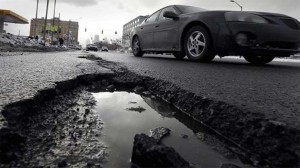Michigan lawmakers will be scrambling over the next few days to work out a compromise meant to generate more than $1 billion to repair roads severely damaged by both a bad winter and heavy truck traffic. And the home of the domestic auto industry isn’t alone. From California to Maine, America’s roadway infrastructure has been crumbling, even as both state and federal dollars needed to fix the problem have come up short.
Perhaps it’s the jarring folks take commuting every day, never mind the cost of replacing tires and keeping suspensions aligned, but despite the nation’s generally anti-tax mindset, a new study indicates U.S. motorists are “fed up” and willing to shell out a bit of cash for road repairs.
In fact, a majority of those surveyed by AAA said they’d be more likely to vote for a member of Congress who supports increased federal spending on transportation.
“Many of us are willing to pay a little more if it means we will have access to better roads, bridges and transit systems,” said AAA President and CEO Bob Darbelnet. “It is time for our nation’s leaders to stand with those in Congress who support improving our country’s transportation system.”
The road and travel service suggests that the sorry state of U.S. roadways already serves as a tax, of sorts, estimating the average motorist must put out about $324 annually for vehicle repairs related to bad roads – such as flat tires. Other studies have indicated that commuters must spend more time behind the wheel, while transportation costs for consumer goods also rise as the result of slower speeds, detours and other delays.
(The average age of US vehicles now at all-time record. Click Here for more.)
The AAA study was based on responses from more than 2,000 Americans over the age of 18, about evenly split between men and women. And it generated some results that might seem to conflict with the current national mood questioning government spending. A full two-thirds, 68% of the respondents, said Washington should increase spending on roads, bridges and mass transit systems. Only 5% said spending should be cut.
With Congress itself considering a hike in the transportation budget, the survey suggests there’s at least something of a mandate to raise more revenue, 52% of those polled telling AAA they’d be willing to pay higher fuel taxes – a subject generally seen as a political “third rail” in Washington.
How much more? One in five said they’d be okay with paying up to $4.99 extra a month. An equal number said $10 or more. The rest of those willing to shell out their cash put the figure somewhere in-between.
And to give lawmakers more ammunition, the study also found 51% of the survey subjects more likely to vote for a member of Congress willing to support increased transportation spending – compared to just 19% who said they’d be less likely to support a lawmaker who took that step.
The poll’s timing was far from coincidental. Funding for the Highway Trust Fund is running short and lawmakers need to take action before their summer recess to keep it solvent.
“Congress must prevent severe maintenance delays during the height of the summer driving season by preventing a Highway Trust Fund bankruptcy in August,” asserted AAA chief Darbelnet, who declared “Americans are fed up” with the state of the nation’s roads and the “political inaction” that has blocked needed repairs.
The federal Highway Trust Fund is currently supported by an 18.4 cents per gallon tax on gasoline and a 24.4 cents per gallon tax on diesel. Congress hasn’t raised it since 1993 despite the nearly fourfold increase in overall fuel prices – which averaged around $1 a gallon that year.
Backers of the Trust Fund note that fuel economy has sharply increased over the last two decades – reaching record levels in May, according to data compiled by the University of Michigan Transportation Research Institute. Several states are now considering ways to increase fees for super high-mileage hybrids and battery cars while others are studying alternatives such as road and registration fees that would be based on a motorist’s annual mileage.
(Rising new car sales match rising fuel economy. Click Here for the story.)


Unfortunately irresponsible government spending in many states has allowed the highway infrastructure to deteriorate to not only unacceptable levels but down right dangerous conditions. It’s quite common to see potholes that are 10″ deep on primary roadways. These routinely destroy tires and suspension while causing multiple accidents. The deterioration is primarily due to neglect, not increased vehicular traffic. Inspections have shown the bridge situation to be in similar disrepair with potentially deadly consequences.
Many states use a legal loophole to prevent being sued for their gross negligence. The loophole gives them 30 days to patch a reported pothole from the time it is reported – even when the pothole is so dangerous that it is reported on the six o’clock news complete with video. It’s a disgrace IMO and due primarily to fiscal mismanagement. Legally protecting governmental gross negligence is a very bad policy, IMO.
Yeah, terrific, only – THERE’S NO MONEY LEFT!
How many times do I have to explain this? Here’s an easy demonstration: http://www.usdebtclock.org